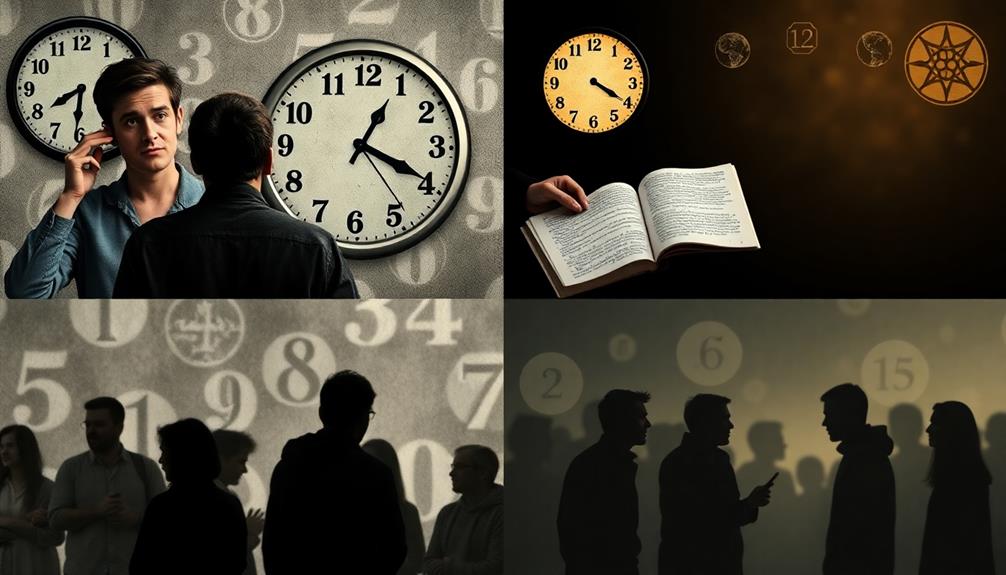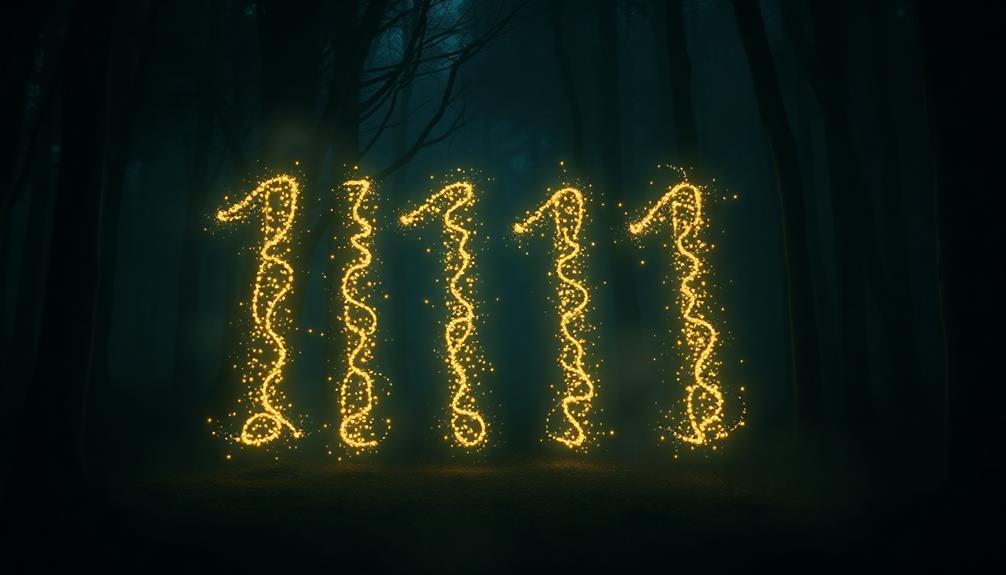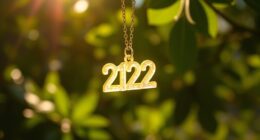Angel numbers might seem meaningful, but they're mainly products of cognitive biases and personal beliefs. There's no empirical evidence backing the idea that these numbers convey divine messages. Instead, you're likely experiencing pareidolia, where you find patterns in random sequences. Confirmation bias could lead you to remember only the moments you spot these numbers while ignoring others. Many interpretations vary based on cultural backgrounds and personal narratives, showing how subjective this phenomenon really is. It's intriguing how often randomness is mistaken for significance, and if you reflect further, you'll uncover more about this fascinating topic.
Key Takeaways
- Angel numbers lack empirical evidence and scientific validation, undermining claims of their significance as spiritual messages.
- Cognitive biases, such as confirmation bias and pareidolia, lead individuals to perceive patterns and meanings in random number occurrences.
- Anecdotal experiences of angel numbers do not constitute reliable evidence, as they often reflect personal beliefs rather than universal truths.
- Cultural interpretations of numbers vary widely, revealing subjective meanings that challenge the notion of universally accepted angel number significance.
- The phenomenon of angel numbers can be explained by randomness and human tendencies to seek meaning in coincidences, rather than divine intervention.
Definition and Origin of Angel Numbers

Angel numbers are fascinating sequences that many believe carry messages from angels or the universe. Defined as repetitive number patterns, these angel numbers show up in everyday life, often on clocks, receipts, or even license plates. They're thought to provide spiritual guidance, particularly during significant moments when you might need reassurance or direction.
This perception aligns with the idea that awareness of these numbers enhances emotional balance, as some individuals report feeling more grounded during challenging times. The concept of angel numbers gained traction through Doreen Virtue's book, "Angel Numbers 101." In it, she outlines methods for interpreting specific number sequences, encouraging readers to find meaning in these occurrences.
However, it's crucial to recognize that the interpretation of angel numbers is highly subjective. Different belief systems and personal experiences shape how you may understand these numbers, making it difficult to find a universal interpretation.
Despite their popularity in New Age spirituality, there's a notable absence of biblical references supporting the existence of angel numbers. This lack of empirical evidence raises questions about their validity. While many find comfort in these sequences, it's vital to approach the phenomenon critically.
Understanding the definition and origin of angel numbers can help clarify their role in deciphering messages within spiritual beliefs and practices.
Psychological Perspectives on Belief

Many people's belief in angel numbers can be understood through various psychological phenomena. For instance, pareidolia leads you to see meaningful patterns, like angel numbers, in random sequences. This tendency reinforces the belief that these numbers hold significance.
Cognitive biases, particularly confirmation bias, play a role too; you may remember the times you spotted angel numbers while ignoring the countless occasions when you didn't, skewing your perception of their frequency and importance.
Additionally, the placebo effect can explain the comfort and guidance many derive from angel numbers. When you believe these numbers are significant, your mindset can foster positive psychological outcomes.
The subjective nature of numerology means that interpretations of angel numbers vary widely among individuals. Your personal experiences and cultural background influence how you perceive these numbers, lacking a universal standard.
Skeptics highlight the absence of empirical evidence and controlled studies, arguing that angel numbers are more about psychological projections than divine messages.
Cultural Context and Interpretations

Cultural beliefs play a big role in how you interpret angel numbers, shaping their meanings based on your background and traditions.
Many societies view certain sequences as signs of spiritual alignment, reflecting shared values and experiences.
Additionally, personal connections to specific numbers often emerge from family stories, further influencing your understanding and significance of these sequences.
Cultural Beliefs Influence Interpretations
Numbers often serve as a canvas for diverse interpretations shaped by cultural beliefs. In different societies, people attribute unique meanings to specific sequences based on their historical and spiritual contexts. For instance, you might find that in one culture, the number 7 symbolizes spiritual awakening, while in another, it represents perfection. Conversely, the number 4 often signifies stability or grounding across various traditions.
Understanding how emotional manipulation can affect perceptions can also reshape the significance of these numbers in relationships, particularly in narcissistic dynamics.
Your understanding of angel numbers can also be influenced by familial beliefs and teachings. Personal narratives and shared experiences with significant numbers help shape your interpretation. If you grew up hearing stories about the importance of certain sequences, those reflections can guide your perception.
Common sequences like 111 or 222 are frequently viewed as indicators of spiritual alignment and harmony in various communities. However, the ambiguity surrounding the spiritual significance of numbers leads to a highly subjective interpretation.
You'll notice that individuals draw from their cultural backgrounds and personal experiences to derive meaning. This diverse array of interpretations highlights that what resonates with you mightn't hold the same weight for someone else, further illustrating the complexity of angel number beliefs.
Spiritual Alignment Across Cultures
Understanding spiritual alignment through angel numbers reveals how interpretations can shift across different cultures. In many Eastern philosophies, numbers aren't just digits; they're intertwined with spiritual energy. For instance, concepts like Feng Shui and Hindu numerology add layers of meaning that can alter your perception of angel numbers considerably.
Additionally, the use of visual language in Deaf communities highlights how different cultures express and interpret concepts, including those related to spirituality.
Indigenous cultures often regard numbers as sacred symbols, viewing them as carriers of divine messages. This perspective contrasts sharply with the contemporary New Age beliefs that tend to dominate in Western societies, where the rise of modern mysticism has popularized angel numbers. Here, you'll find a blend of personal growth narratives that focus on individual spiritual journeys, illustrating how context shapes interpretation.
Your family beliefs and teachings also play a vital role. The shared experiences and cultural narratives you grow up with can deeply influence how you perceive specific numbers.
As you explore the meanings behind angel numbers, consider how these diverse cultural lenses can lead to vastly different interpretations. Recognizing this complexity may prompt you to question the validity of universally accepted meanings, highlighting the subjective nature of spiritual alignment.
Personal Connections to Numbers
Throughout your life, the significance of certain numbers often emerges from personal experiences and the cultural narratives surrounding them. You might find that numbers like 7 or 4 resonate with you due to cherished family memories or spiritual teachings passed down through generations. These connections can shape how you interpret the world around you.
Different cultures attribute unique meanings to specific numbers, which can greatly impact your understanding of them. For instance, in some societies, the number 8 symbolizes prosperity, while in others, it may represent balance. This cultural context can deepen your attachment to certain numbers and influence your emotional responses when you encounter them repeatedly.
Your family's beliefs and discussions around numerology can further enrich your perspective on numbers. If your parents often talked about the significance of specific sequences, that shared narrative can create a strong personal connection to those numbers.
As you experience emotional triggers tied to these numerical patterns, your individual interpretations solidify, making it essential to recognize how personal and cultural contexts shape your understanding of numbers in your life.
Scientific Critique of Angel Numbers

While many people find comfort in the idea of angel numbers, scientific critiques reveal a lack of empirical evidence to support their existence. Critics argue that the fascination with these numbers often stems from psychological phenomena rather than any actual spiritual significance.
Here are three key points to reflect upon:
- Cognitive Biases: You might notice repetitive numbers due to cognitive biases, like confirmation bias and the frequency illusion, leading you to attribute special meaning to them when they're merely coincidences.
- Pareidolia: This psychological phenomenon explains how your brain seeks patterns in random data. When you see an angel number, it's likely your mind is simply interpreting random occurrences as meaningful.
- Lack of Validation: Numerology and the interpretations surrounding angel numbers haven't undergone rigorous scientific studies. Without empirical support, their claims and meanings remain questionable.
Ultimately, the allure of angel numbers may lie in the comfort and meaning they provide rather than any objective reality.
Recognizing these critiques can help you understand the distinction between subjective experiences and scientifically validated phenomena.
Personal Experiences and Anecdotes

Many people share personal stories about seeing angel numbers during important times in their lives, believing these numbers offer guidance.
You might find it interesting how these interpretations can vary widely, often shaped by individual experiences.
However, it's crucial to reflect on whether these anecdotes hold real significance or simply reflect a tendency to notice what aligns with your beliefs.
Subjective Interpretations of Numbers
Have you ever noticed a particular number appearing repeatedly in your life, only to wonder if it holds a deeper meaning? Many people experience this phenomenon, often attributing unique significance to these numbers based on personal experiences and emotional states. Your interpretation of these numbers can vary immensely from someone else's, influenced by various factors.
- Life Events: You might see a specific number during a significant life change, interpreting it as a sign of guidance or support.
- Emotional States: When you're feeling introspective or facing tough decisions, the presence of certain numbers can evoke comfort, reinforcing the belief in their importance.
- Familial Influence: Your understanding of angel numbers may be shaped by teachings from your parents or shared family beliefs, further personalizing your interpretations.
These subjective interpretations create a strong emotional connection, leading you to notice these numbers more frequently during times of growth.
Even if the evidence supporting angel numbers is lacking, your personal narrative and experiences can deeply embed the belief in their significance, making it hard to dismiss.
Anecdotal Evidence vs. Reality
Personal experiences often shape our perceptions of angel numbers, but these anecdotes can blur the line between belief and reality. When you hear stories about individuals finding meaning in these numbers, it's crucial to recognize that such experiences are subjective. Without scientific validation, they rely heavily on personal interpretation, which can vary widely.
Many people report significant events coinciding with sightings of angel numbers, but this can often be chalked up to cognitive biases. You might notice patterns that confirm your existing beliefs, a phenomenon known as confirmation bias.
Additionally, pareidolia — the tendency to see familiar patterns in random stimuli — can lead you to associate certain numbers with meaningful experiences in your life.
The absence of controlled studies and empirical evidence supporting angel numbers raises skepticism. Personal anecdotes, while compelling, don't constitute scientific proof.
Moreover, the lack of a consistent framework for interpreting these numbers means they often reflect individual narratives rather than an objective reality. Relying solely on personal experiences can mislead you, distorting how you view the significance of angel numbers in your life.
The Role of Skepticism

Skepticism plays an essential role in how we interpret angel numbers and their significance. Without a critical perspective, it's easy to get swept up in the allure of these phenomena.
However, acknowledging the lack of empirical evidence is vital. Critics highlight several key points that challenge the validity of angel numbers:
- Cognitive Biases: Your brain might be hardwired to recognize patterns, often leading to confirmation bias. You notice angel numbers only because you want to see them, not because they hold any real significance.
- Pareidolia: This psychological phenomenon causes you to perceive familiar shapes or patterns in random stimuli. It's why you might see a number sequence as meaningful when it's just a coincidence.
- Lack of Scientific Validation: Research on numerology hasn't undergone rigorous testing, leaving claims about angel numbers unsubstantiated.
Alternative Explanations for Coincidences

Many people find themselves noticing certain numbers repeatedly, which can lead to the belief that these occurrences hold special meaning. However, this phenomenon often stems from pareidolia, where your brain seeks familiar patterns in randomness. This natural tendency makes you more likely to assign significance to random number sightings.
Cognitive biases, particularly confirmation bias, also play an essential role. You might remember the times you see a specific number while overlooking countless instances when it doesn't appear. This selective attention reinforces the belief that these numbers are important.
Moreover, statistics reveal that with an immense variety of number combinations, it's statistically probable that you'll encounter specific sequences by chance. Your brain is wired to find meaning in experiences, often leading you to attribute importance to coincidences when no actual correlation exists.
Research shows that searching for personal meaning in these coincidences reflects a universal human desire for control and understanding in an unpredictable world.
Frequently Asked Questions
Are Angel Numbers a Real Thing?
You might wonder if angel numbers are a real thing.
While many people believe these repetitive number sequences carry messages from a higher power, there's no scientific evidence to back that up.
What you perceive as patterns could be influenced by your brain's tendency to find meaning in randomness.
Ultimately, whether you see angel numbers as meaningful or not depends on your personal beliefs and experiences, but they lack concrete validation.
What Is the Science Behind Seeing Angel Numbers?
You might notice certain numbers popping up repeatedly in your life, and it feels like a sign.
But the science behind seeing these "angel numbers" often points to cognitive biases. You tend to notice patterns that resonate with your beliefs, a phenomenon called confirmation bias.
Plus, your brain's knack for pareidolia could lead you to see familiar sequences in random occurrences.
Ultimately, it's about finding personal meaning in the chaos of life.
Where Did the Angel Numbers Originate From?
Angel numbers originated from a blend of numerology and New Age spirituality, gaining traction through Doreen Virtue's book "Angel Numbers 101."
In this book, she links specific number sequences to angelic guidance, appealing to those seeking deeper meanings in life.
As you explore these concepts, you'll find that different cultures have historically attributed unique meanings to numbers, but there's no universal agreement on their significance, making the phenomenon quite subjective.
Do Angel Numbers Go Against Christianity?
You might feel like you're tapping into a divine secret when you see angel numbers, but many Christians see it differently.
They argue that these numbers clash with their faith, steering you away from prayer and scripture. Relying on angel numbers for guidance could lead you down a slippery slope, distracting you from the true spiritual connection.
Instead of seeking signs in numbers, why not dive deeper into the teachings you already cherish?
Conclusion
In the end, believing in angel numbers can feel like chasing shadows—captivating yet elusive. While it's easy to get swept up in their allure, remember that coincidences often stem from our own interpretations. Instead of searching for signs in the universe, focus on the tangible choices you can make in your life. Skepticism can be your compass, guiding you through the fog of superstition toward clearer, more rational ground. Embrace the here and now; it's where real answers lie.










